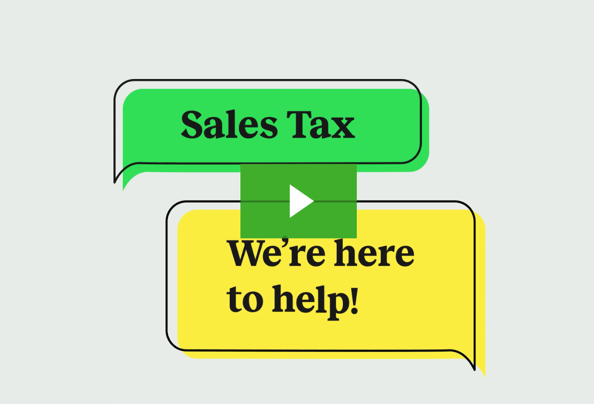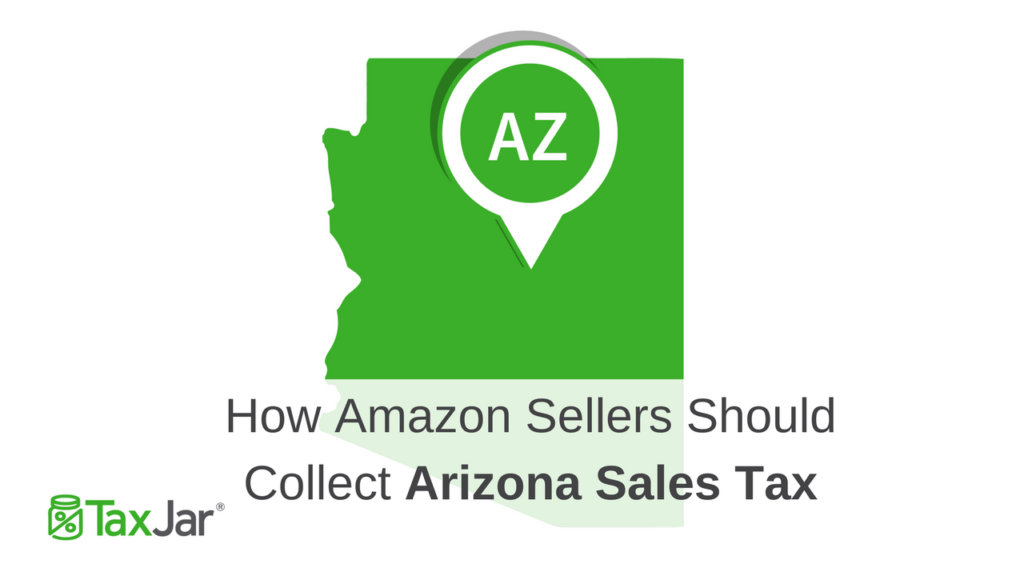How Amazon Sellers Should Collect Arizona Sales Tax
by May 17, 2017
Important update: As of October 1, 2019 Amazon now collects sales tax on behalf of Arizona sellers. Learn more about marketplace facilitator sales tax collection here.
This is Part Two of a two-part post on Arizona sales tax and eCommerce sellers. Part one explained the difference between sales tax, use tax and Arizona’s “transaction privilege tax.” This post will talk about how Amazon FBA sellers should collect sales tax in Arizona.
Here are answers to some of our most commonly asked questions about sales tax in Arizona:
What type of tax should an Amazon FBA seller be collecting for sales to Arizona customers?
If you are an Amazon FBA seller with inventory shipping out of fulfillment centers in Arizona, you have met conditions sufficient to establish nexus in Arizona. Because the requirements for nexus and the criteria to attach the levy of transaction privilege tax on a seller are so similar, it is safe to say: if you have nexus in Arizona, you should be remitting transaction privilege tax for all your taxable sales to Arizona customers.
What about my sales that are not shipped from locations in Arizona?
Since transaction privilege tax is based on a seller’s volume of sales activity, not individual sales transactions, the place from which the sale ships is irrelevant if you have nexus in the state. It is our position that all sellers with nexus in Arizona should be paying Transaction Privilege Tax on all their taxable sales.
Amazon, however, appears to be applying Retailer’s Use Tax rates, in some cases, to sales shipped to customers in Arizona from outside the state. We are not exactly sure what Amazon’s interpretation of Arizona’s tax law is, but it has become apparent that they sometimes do things a little differently.
Why does TaxJar feel that out-of-state sellers with nexus in Arizona should be charging Transaction Privilege Tax instead of Retailer’s Use Tax?
Transaction Privilege Tax is based on the total revenues derived from taxable activities in the State of Arizona. It is not a transaction tax, like sales tax, so there should be no distinction made from one sale to the next.
In Arizona Transaction Privilege Tax Ruling TPR 16-1, the Arizona Department of Revenue expresses the following:
“A business does not have to have a physical location in Arizona to be subject to TPT. An out-of-state business may be subject to TPT if the business is engaged in an activity within Arizona under one of the taxable business classifications and it has a ‘substantial nexus’ with Arizona.”
“If a person engaged in business within Arizona does not have a substantial nexus for TPT purposes, Arizona’s use tax may apply.”
“A substantial nexus with Arizona must be present in order for Arizona to impose either TPT or the duty to collect use tax on an out-of-state business. For either tax, the substantial nexus requirement is generally satisfied if any person or business resides in Arizona; maintains an inventory warehouse or place of business in Arizona; or maintains an employee, independent contractor or other business representative or agent in Arizona. In all other instances, a case-by-base determination must be made.”
“Arizona takes the position that a higher level of nexus is not required to impose TPT over use tax and will generally impose TPT rather than use tax if a substantial nexus is present. In determining which tax is appropriate, Arizona may consider whether the activities that establish a nexus are related or unrelated to the business activity sought to be taxed.”
The original TPR 16-1 may be found on Arizona’s website here.
Which sellers should be collecting Retailer’s Use Tax in Arizona?
To the best of our knowledge, only sellers without nexus who voluntarily register with AZ and collect taxes as a convenience to their customers would be eligible to remit retailer’s use tax instead of transaction privilege tax. This may change in the future if Arizona tries to implement some kind of click-through nexus (established by a certain dollar-volume of sales activity) against non-resident sellers.
TPT and Use Tax are reported on the same tax return, so why does it matter?
In Arizona, the state TPT and use tax rates are equal; however, counties do not currently levy any use tax, and cities often have use tax rates which are less than their Transaction Privilege Tax rates or do not have use tax at all. If the seller chooses to collect use tax instead of TPT, they will certainly be charging a lower rate than what is due for all their Arizona sales. Again, since the TPT is levied on the seller and not the purchaser, the seller would have to assume the full duty of any uncollected taxes himself/herself and would have no recourse to recover uncollected taxes from customers (like they legally would be able to do with uncollected sales tax).
Arizona also requires that tax types are distinguished using codes on the return – 017 for TPT and 029 for use tax.
Does the type of tax charged determine the local jurisdiction to which the tax is due?
No. Fortunately, the sourcing rules for Arizona are pretty simple:
If the order for the sale was received at a location in Arizona, the tax is due to the taxing jurisdiction in which the order was received.
If the order for the sale was received at a location outside Arizona, the tax is due to the taxing jurisdiction in which the customer is located.
I’ve heard that Amazon should be collecting and remitting the taxes for all Arizona sales, not 3rd party merchants. Is this true?
In example 6 of TPR 16-3, the Arizona Department of Revenue appears to state that a company performing the same services as Amazon does for third-party sellers would be responsible for collecting and remitting the Transaction Privilege Taxes due on all sales made by these third-party sellers.
We at TaxJar do not give legal advice, but we strongly recommend that FBA sellers consider the following facts before relying on this ruling and refraining from collecting and remitting Transaction Privilege Tax on their sales to Arizona customers:
- The fact that Arizona Department of Revenue is stating that a company like Amazon has the duty to collect and remit TPT on FBA sales does not relieve the FBA seller of such duty. Arizona does not have the authority to collect the same tax from two parties, but if Amazon does not collect the tax, the FBA seller could still be held responsible, as they clearly meet all the conditions necessary to be subject to TPT.
- To the best of our knowledge, Amazon does not currently collect and remit TPT for any FBA sales. This means that taxes for any of your FBA sales to customers in Arizona would be unpaid. Arizona TPR rulings are not legally binding, so the DOR could change their position at any time and choose to recover these taxes from FBA sellers.
- In the logic presented in TPR 16-3, the department considers the fulfillment activities of companies like Amazon to be synonymous with “selling at retail.” We are concerned that the department did not directly address a key component of a sale in their explanation – consideration. Amazon does not receive the full amount of consideration (monies or value received) for a sale, so these monies never are part of Amazon’s gross proceeds, gross income, or value derived from the sales; thus, the full amount of the sales never becomes part of Amazon’s taxable base. Amazon only receives consideration for the services they rendered to the third-party sellers, so that should be the extent of their taxable base. If a court rules that Amazon is not responsible for the taxes, the third-party sellers would still be on the hook. Amazon seems to share the opinion that they are not responsible for these taxes, so a future court case is very likely.
- If FBA sellers are found to be responsible for these taxes at some point, they would not even have the option to attempt to bill their customers for the taxes, because TPT is a tax on the seller, not the purchaser. The seller could be found to be responsible for all the taxes herself/himself. This scenario could be avoided entirely just be collecting and remitting the taxes.
If you would like to read the ruling yourself, Arizona TPR 16-3 can be found on Arizona’s website here.
If you are still unsure, you can always request a private ruling directly from the department by e-mail at [email protected]
Does this change my Amazon tax settings?
In short, no. Use the same Amazon sales tax settings detailed in our FBA Sales Tax Guide and you should be all set.
To sum all this up in a few short sentences:
- Arizona does sales tax a little bit differently than most states.
- We feel that all sellers with nexus in Arizona should be charging Transaction Privilege Tax, not Retailer’s Use Tax, on all taxable sales shipped to customers in Arizona.
- Amazon may be charging Retailer’s Use Tax rates, which are less than the Transaction Privilege Tax rates, on some of your Arizona sales.
- While Amazon sellers need to make their own decision on whether to collect and remit in Arizona, we think it prudent to be cautious in relying too heavily upon Arizona TPR 16-3 and refraining from collecting taxes on their Arizona sales.
Do you have questions or something to say about collecting sales tax in Arizona? Start the conversation in the comments!










